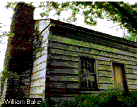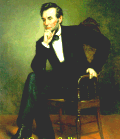Abraham
Lincoln
Sixteenth President 1861-1865
Fun Fact: During the Civil War, telegraph wires were
strung to follow the action on the battle field. But there was
no telegraph office in the White House, so Lincoln went across
the street to the War Department to get the news.
Biography:
Abraham Lincoln warned the South in his Inaugural Address: “In
your hands, my dissatisfied fellow countrymen, and not in
mine, is the momentous issue of civil war. The government will
not as sail as you…. You have no oath registered in Heaven to
destroy the government, while I shall have the most solemn one
to preserve, protect and defend it.”
Lincoln thought secession illegal, and was
willing to use force to defend Federal law and the Union. When
Confederate batteries fired on Fort Sumter and forced its
surrender, he called on the states for 75,000 volunteers. Four
more slave states joined the Confederacy but four remained
within the Union. The Civil War had begun.
 The
son of a Kentucky frontiersman, Lincoln had to struggle for a
living and for learning. Five months before receiving his
party's nomination for President, he sketched his life: The
son of a Kentucky frontiersman, Lincoln had to struggle for a
living and for learning. Five months before receiving his
party's nomination for President, he sketched his life:
“I was born Feb. 12, 1809, in Hardin
County, Kentucky. My parents were both born in Virginia, of
undistinguished families-second families, perhaps I should
say. My mother, who died in my tenth year, was of a family of
the name of Hanks …. My father … removed from Kentucky to …
Indiana, in my eighth year …. It was a wild region, with many
bears and other wild animals still in the woods. There I grew
up …. Of course when I came of age I did not know much. Still
somehow, I could read, write, and cipher … but that was all.”
Lincoln made extraordinary efforts to
attain knowledge while working on a farm, splitting rails for
fences, and keeping store at New Salem, Illinois. He was a
captain in the Black Hawk War, spent eight years in the
Illinois legislature, and rode the circuit of courts for many
years. His law partner said of him, “His ambition was a little
engine that knew no rest.”
 He
married Mary Todd, and they had four boys, only one of whom
lived to maturity. He
married Mary Todd, and they had four boys, only one of whom
lived to maturity.
In 1858 Lincoln ran against Stephen A.
Douglas for Senator. He lost the election, but in debating
with Douglas he gained a national reputation that won him the
Republic a nomination for President in 1860.
As President, he built the Republican
Party into a strong national organization. Further, he rallied
most of the northern Democrats to the Union cause.
On January 1, 1863, he issued the
Emancipation Proclamation that declared forever free those
slaves within the Confederacy.
Lincoln never let the world forget that
the Civil War involved an even larger issue. This hesitated
most movingly in dedicating the military cemetery at
Gettysburg:“that we here highly resolve that these dead shall
not have died in vain-that this nation, under God, shall have
a new birth of freedom-and that government of the people, by
the people, for the people, shall not perish from the earth.”
 Lincoln
won re-election in 1864, as Union military triumphs heralded
an end to the war. In his planning for peace, the President
was flexible and generous, encouraging Southerners to lay down
their arms and join speedily in reunion. Lincoln
won re-election in 1864, as Union military triumphs heralded
an end to the war. In his planning for peace, the President
was flexible and generous, encouraging Southerners to lay down
their arms and join speedily in reunion.
The spirit that guided him was clearly
that of his Second Inaugural Address, now inscribed on one
wall of the Lincoln Memorial in Washington, D.C.:
“With malice toward none; with charity for
all; with firmness in the right, as God gives us to see the
right, let us strive on to finish the work we are in; to bind
up the nation's wounds ….”
 On
Good Friday, April 14, 1865, Lincoln was assassinated at
Ford's theatre in Washington by John Wilkes Booth, an actor,
who somehow thought he was helping the South. The opposite was
the result, for with Lincoln's death, the possibility of peace
with magnanimity died. On
Good Friday, April 14, 1865, Lincoln was assassinated at
Ford's theatre in Washington by John Wilkes Booth, an actor,
who somehow thought he was helping the South. The opposite was
the result, for with Lincoln's death, the possibility of peace
with magnanimity died.
Stowe, Harriet Beecher
Stowe, Harriet Beecher (1811-1896), American writer
and abolitionist, author of Uncle Tom's Cabin (1852), a
forceful indictment of slavery and one of the most powerful
novels of its kind in American literature. Born in Litchfield,
Connecticut, Stowe was the daughter of the liberal clergyman
Lyman Beecher. Her husband, the Reverend Calvin Ellis Stowe,
was also an ardent opponent of slavery. Her first book, The
May flower, or Sketches of Scenes and Characters Among the
Descendants of the Pilgrims, appeared in 1843. While
living in Brunswick, Maine, Stowe wrote Uncle Tom's Cabin.
It was serialized in 1851 and 1852 in an abolitionist paper,
the National Era, and issued as a book in 1852.
Uncle Tom's Cabin, was widely read in the United
States and abroad and moved many to join the cause of
abolition. The South indignantly denied this indictment of
slavery. Stowe's book increased partisan feeling over slavery
and intensified sectional differences.
As a serial, the story attracted no unusual notice. The
success of the book, however, was unprecedented; 500,000
copies were sold in the United States alone within five years,
and it was translated into more than 20 foreign languages. It
did much to crystallize militant antislavery sentiment in the
North, and therefore was an important factor in precipitating
the American Civil War (1861-1865).
In 1853 Stowe issued A Key to Uncle Tom's Cabin,
containing an impressive array of documentary evidence in
support of her attack upon slavery. She returned to the attack
in Dred: A Tale of the Great Dismal Swamp (1856).
The Minister's Wooing (1859) is the best known of Stowe's
several romantic novels dealing with New England life in the
18th and early 19th centuries. She also wrote short stories
and religious poetry.
|